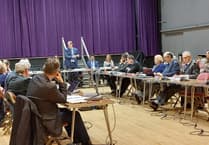THE Surrey Primary Care Trust (PCT) is hoping to retain some services at all three west Surrey hospitals that have come under the microscope - the Royal Surrey, Frimley Park and Ashford and St Peter's. This much emerged this week, as the PCT fired off a statement in response to the publication of what were claimed to be "explosive documents" revealing "the real threat of closure" to the Royal Surrey. But although the statement carried the hope that the Royal Surrey will be saved from total closure, there was no such crumb of comfort forthcoming over its A&E department. A trust spokesman made clear to The Herald on Tuesday that a shake-up in the number of hospital A&E units is still very much in the melting point. No date could be given for the release of options for public consultation. The "explosive documents" were revealed in a press release from South West Surrey MP Jeremy Hunt. Obtained by Conservative borough councillor for Merrow Sheridan Westlake, under the Freedom of Information Act, the confidential papers showed how, in June 2006, eight scenarios were being modelled to turn round a £69 million deficit predicted in 2008/09. According to the PCT, its thinking has moved on since the documents were produced. In fact, last November formal consultation was delayed to give extra time to develop the plans. Nevertheless, of the eight scenarios being modelled last summer, four concentrated on closing the Royal Surrey A&E. The other four each involved the closure of acute services at Epsom together with another entire hospital - the Royal Surrey, Frimley Park, Ashford and St Peter's or the East Surrey at Redhill. A factpack produced last August showed closure of the 500-bed Royal Surrey to be the biggest saver, creating a surplus of up to £9 million. Closure of Frimley Park, by contrast, would still leave a deficit of £6 million. It went on to detail how the Royal Surrey could close in 2009, with estimated total redundancy costs of £36 million representing an average payout of £38,500 to 710 staff. In addition, the sell-off of the site could be expected to involve a net write-off of £39 million. In another document, the Surrey Ambulance Service warned of significant increases in ambulance transfer times from an incident to hospital if the A&E closure went ahead. The "blue light transfer times" for a Haslemere patient from being picked up to the hospital front door were calculated to increase from 12 to 13 minutes up to 24 minutes if they had to be taken to Frimley Park. Even worse, patients in Ewhurst would also see travel time double, up to a massive 40 minutes. Three times as many incidents would be more than 19 minutes from an A&E – a key health indicator - if the Royal Surrey closes. Jeremy Hunt said: "These papers highlight just how severe the consequences would be if the Royal Surrey's A&E were to be closed – yet the Surrey PCT is considering several ways of how to do just that. "I am very concerned that the increased journey times, the cuts to services and the reduction in staff would all be dangerously detrimental to local people's welfare." Sheridan Westlake claimed: "These previously secret papers expose the financial black hole in Surrey's NHS. . . No wonder the government now wants to curtail the Freedom of Information Act, given its use is exposing their record of public sector mismanagement." The statement from the PCT, indicating that the documents were behind the times, rebutted the claim that the papers were secret "as we have been publicly discussing all potential scenarios for change with patients, public and other key stakeholders for many months". It added: "We are now looking at several network options, led by clinicians from the acute trusts across Surrey. "In west Surrey, we hope to achieve a model of care where services are retained at all three hospital sites: Ashford and St Peter's, Frimley Park and the Royal Surrey County." The statement continued: "This whole programme is about services, not the buildings they are in and it is important we are realistic in our planning and consider every single option." Asserting that many local clinicians have recognised the need for change, the statement quoted Ed Palfrey, medical director and consultant urologist at Frimley Park Hospital. "We simply want to provide the best medical care in the most appropriate place for our patients. This may mean care closer to home, but it is also ensuring timely access to the most specialist life-saving treatments which may not necessarily be at the nearest physical location," said Mr Palfrey.



